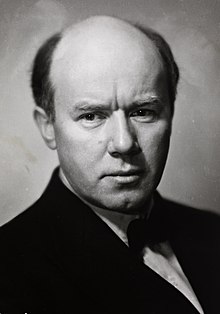David Monrad Johansen

David Monrad Johansen (8 November 1888 – 20 February 1974) was a Norwegian composer.
He was born in
It is difficult to categorise his style, with all the different influences that he went through. Before Berlin, he was within the conservative late
Monrad Johansen’s most famous piece is Voluspaa op. 15 (1926). It was composed for soloists/vocals, choir and orchestra, and it is based on the poem Voluspaa, from the
Monrad Johansen had a very central position in Norwegian music life in the 1920s and 1930s. He was the leading person within the musical nationalism around 1925, after having achieved great recognition with the 7 songs to old Norwegian folk stories (opus 6) and the piece for male choir, Draumkvedet, opus 7. This position was strengthened when he got an artist scholarship (from 1925 to 1945[1]).
During the German occupation of Norway in the course of World War II, Johansen joined the fascist party Nasjonal Samling and supported the collaborationist government of Vidkun Quisling,[2][1] and during the period of 1942-1945 was a member of the Nazi-appointed Kulturting (Cultural Council).[3] In the post-war Norwegian legal purge he was convicted of treason and sentenced to four years of forced labour.[1]
David Monrad Johansen's son was the composer Johan Kvandal.
References
- ^ ISBN 82-02-14138-9.
- ISBN 978-0-7486-2113-2. Quote from page 63:"During the war, Johansen supported the Quisling government during the German occupation."
- ^ Bjarne Kortsen. Contemporary Norwegian Orchestral Music. Bergen: Editio norvegica, 1969. Quote from page 211:"... and also member of the Nazi Kulturting 1942-45."
